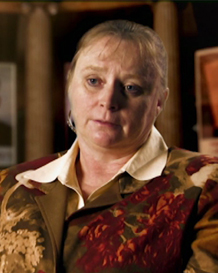
Francoise Bonnell
Francoise Bonnell, Ph.D., is the director of the U.S. Army Women's Museum at Fort Lee, Virginia. She is an author and a recognized authority in women’s military history.
QUESTION: Women have been involved in every American conflict since the beginning. Can
you elaborate on that?
FRANCOISE BONNELL: I think the service of women to the country, in the military, has been
extraordinary. And it does go back all the way to the American Revolution. It's been somewhat
informal in the early years, maybe the first hundred, hundred and fifty years of American history.
Their contributions, nonetheless, are equally as important as when they were finally put into
uniform, which in the Navy is in World War I and then for the rest of the services in World War
II. Their contributions over that time have differed, but they’ve always brought something to the
conflict that, without them, that particular mission or that particular even would not have been as
successful as it was.
QUESTION: We really don't have an understanding or an appreciation of women in combat all
the way back.
FRANCOISE BONNELL: Yes, absolutely right, especially World War II; but I think also, when
it comes to women's history, people tend to look at things in terms of numbers. For example,
you look at the 400 women in the Civil War who disguised themselves as men. The number is
seemingly small compared to the millions of men that participated, as well as the 600,000 dead,
etcetera. But really, it's not the numbers that's important, it is in fact the contributions, and in
some cases the contributions of an individual by themselves.
QUESTION: What was the general opinion of women taking up arms during the Revolutionary
War?
FRANCOISE BONNELL: Well, I don't think necessarily it was a society that would have
supported the idea that a woman had to take up arms against their enemy. But society at the time
also had women in some cases doing somewhat manly types of jobs. In fact, in some of the
cases, some of them were quite proficient with their rifles, their guns, not so much that they
could join the military and go out and engage the enemy, but more so for their own protection,
their own defense, and in some cases, their own livelihood, perhaps for hunting and those kinds
of things. Most of the things that women did during the American Revolution did not
necessarily require them to kill an enemy so to speak, but they did contribute significantly to the
ability of, you know, the fledgling Nation to be able to fight for their independence.


